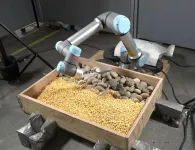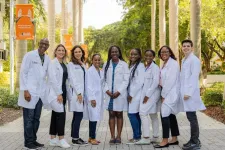(Press-News.org) An investment of £53 million in six research centres will drive forward change in the energy system and help to meet the UK’s net zero target by 2050.
The energy research centres will boost knowledge, create innovative green technologies and reduce demand for energy to achieve greener, cleaner domestic, industrial and transport energy systems.
UK Research and Innovation (UKRI) has awarded:
£15 million for a new Energy Demand Research Centre that will provide solutions for energy demand reduction, understand the impact on consumers, and enable equitable policy decision-making.
£17.5 million investment in three Supergen research hubs that will boost innovation in energy distribution, both nationally and internationally, and propel discoveries in renewable energy into impactful new technologies.
£20 million in two hubs that deliver options to integrate clean and sustainable hydrogen into the domestic, industrial and transport energy systems.
Professor Dame Ottoline Leyser, Chief Executive of UKRI, said:
“The government has set a target of reaching net zero emissions by 2050, requiring rapid decarbonisation of our energy systems. UKRI is leveraging its ability to work across disciplines to support this ambition through a major portfolio of investments that will catalyse innovation and new green energy systems.
“The funding announced today will support researchers and innovators to develop game changing ideas to improve domestic, industrial and transport energy systems.”
Energy Demand Research Centre
Reducing energy use could help meet half of the required emissions reductions we need to reach net zero emissions by 2050.
A new national Energy Demand Research Centre will build an evidence base for understanding consumer behaviour, assessing the impact of socio-technical energy demand reduction measures, and research mechanisms to improve energy efficiency.
The centre, based at the universities of Sussex and Newcastle, will investigate how domestic, industrial and transport energy demand reduction can be delivered on a local and national level across the UK.
The centre has been awarded £15 million from EPSRC and the Economic and Social Research Council (ESRC).
Hydrogen Hubs
Hydrogen and hydrogen-based, low-carbon liquid fuels, such as ammonia, are essential for the UK to reach net zero emissions by 2050. Hydrogen is a highly versatile energy vector suitable for use in many hard-to-decarbonise sectors where other energy options, such as electricity, are not suitable. These two hubs will drive forward the national effort in hydrogen research that is needed to facilitate this critical area of technology to meet industry and government needs.
The UK-HyRES Hydrogen Hub, led by the University of Bath, aims to become an international leader in hydrogen research and to deliver practical hydrogen and alternative liquid fuel technologies that are safe, acceptable, and environmentally and economically sustainable.
The HI-ACT Hub, led by Newcastle University, will evaluate routes to effective integration of hydrogen into the wider energy landscape, addressing interactions with electricity, natural gas, heat, and transport. By considering a whole systems perspective, the research shall identify where hydrogen offers most value.
Each hub has been awarded £10 million funding by EPSRC.
Supergen Impact Hubs
Three impact hubs will study how the UK can take advantage of the latest research in energy generation from renewable sources.
The Supergen Energy Networks Impact Hub, at the University of Bristol, will investigate modernisation of energy distribution systems between suppliers and users to become a driving force towards a rapid, safe and just transition to net zero.
Based at the University of Plymouth, the Supergen Offshore Renewable Energy (ORE) Impact Hub delivers research to accelerate the impact of current generation and future ORE devices and systems. Researchers focus on innovation and new technologies in wave, tidal, solar and wind power.
The Supergen Bioenergy Impact Hub, based at Aston University, will continue to support the UK's transition to a low carbon energy future by identifying pathways for delivering bioenergy with wider social, economic and environmental benefits.
The hubs are funded by EPSRC, with the Supergen Bioenergy Impact Hub also receiving support from the Biotechnology and Biological Sciences Research Council (BBSRC).
Ends
Notes to Editors:
Media enquiries:
Sophie Docker, Senior Media and Communications Manager
Sophie.docker@ukri.org or 07513 485076
Further information:
Hydrogen Hubs have been awarded £20 million:
Hydrogen Integration for Accelerated Energy Transitions Hub (HI-ACT)
Led by Professor Sara Walker, Newcastle University
Partner universities: University College London, Cardiff, Exeter, Glasgow, Birmingham, Queens University Belfast, Manchester, Warwick, Imperial.
The UK Government has set out high expectations for the role of hydrogen, with demand predicted to be 250-460 TWh in 2050 (with early adoption in industry and transport) equivalent to 20-35 per cent of UK’s total expected energy consumption. This hub will provide a focus for the UK research community, working in close partnership with businesses, governments, and administrations to tackle research challenges that underpin the hydrogen production, storage and distribution parts of the hydrogen value chain.
The HI-ACT Hub will ensure that hydrogen is appropriately integrated in a future equitable energy system, through holistic multi-disciplinary research which address integration challenges.
UK-HyRES: Hub for Research Challenges in Hydrogen and Alternative Liquid Fuels
Led by Professor Tim Mays, University of Bath.
Partner universities: Sheffield, University College London, Portsmouth, St Andrews, Surrey, Sheffield, Warwick
The UK-HyRES hub will identify, prioritise and deliver solutions to research challenges that will accelerate the take up of hydrogen and alternative liquid fuels. This hub will work provide a network and collaboration platform to tackle research challenges that underpin the production, storage distribution and end use of hydrogen and liquid fuels.
The team will coordinate a national, interdisciplinary programme of research to ensure a pipeline of projects that can deliver practical H&ALF technologies that are safe and environmentally, economically and socially sustainable, de-coupling fossil fuels from our energy system and delivering greener energy. UK-HyRES aims to be recognised internationally as a global centre of excellence and impact.
Supergen Hubs
Supergen Energy Networks Impact Hub 2023
Led by Professor Philip Taylor, University of Bristol
Energy networks exist primarily to exploit and facilitate temporal and spatial diversity in energy production and use and to exploit economies of scale. The hub will carry out highly impactful interdisciplinary research such that energy networks are not just enablers of the low carbon transition but become a driving force towards a rapid, safe and just transition to net zero.
Good progress has been made in de-carbonisation in some areas but this hub will accelerate the development, scale up the deployment and increase the impact delivered.
£5 million funding from EPSRC
Supergen ORE Impact Hub 2023
Led by Professor Deborah Greaves, University of Plymouth
The UK is leading the development and installation of offshore renewable energy (ORE) technologies. With over 13GW of installed offshore wind capacity and another 3GW under construction, ORE will provide the backbone of the Net Zero energy system. The revised UK targets that underpin the Energy Security Strategy seek to grow offshore wind capacity to 50 GW, with up to 5 GW floating offshore wind by 2030.
To achieve these levels of deployment, ORE developments need to move beyond current sites to more challenging locations in deeper water, further from shore, while the increasing pace of deployment introduces major challenges in consenting, manufacture and installation.
£7.5 million funding from EPSRC.
Supergen Bioenergy Impact Hub
Led by Professor Patricia Thornley, Aston University
The UK could have sufficient indigenous biomass and waste to provide 40% of the UK's primary energy demand. The vision of the Supergen Bioenergy Hub is to increase sustainable biomass production in the UK to minimise greenhouse gas emissions.
Bioenergy is a significant and increasing UK renewable energy, but there are key challenges: sustainability and priority uses.
The Supergen Bioenergy Hub will work with stakeholders from academia, industry, and the wider society, to develop sustainable bioenergy systems that will support the UK’s transition to an affordable, resilient, low-carbon energy future.
£5 million funding from EPSRC and BBSRC.
Energy Demand Research Centre (EDRC)
Led by Professor Mari Martiskainen, University of Sussex and Professor Sara Walker, Newcastle University
Partner universities: Cardiff, Edinburgh, Imperial, Lancaster, University College London, Leeds, Manchester, Reading, Strathclyde, Surrey,
Fundamental changes are needed in society to enable a deep energy demand reduction and wide use of low-carbon technologies. Energy demand reduction will improve energy security, reduce household energy bills and address climate change. Reducing energy use could help meet half of the required emissions reductions we need to become a Net Zero society by 2050.
The EDRC will build an evidence base for understanding the impact of energy demand reduction, from the perspectives of what low energy demand futures may be like, how energy demand could become more flexible, what place-based solutions, skills and policies are needed, how energy demand can be embedded in governance.
Funding of £15 million has been awarded by EPSRC and ESRC.
About UK Research and Innovation
UK Research and Innovation (UKRI) is the largest public funder of research and innovation in the UK, investing £8 billion annually spanning all disciplines and all sectors. We are nine councils, drawing on our unique breadth and depth of expertise to work with government and other stakeholders to enrich lives, by increasing our understanding of ourselves and the world around us, supporting innovative businesses and public services, and creating high-quality jobs throughout the UK.
END
Six research centers will lead innovation towards a fully sustainable energy sector
£53 million in funding awarded by UK Research and Innovation to boost knowledge, innovation and new technologies to decarbonize the energy sector
2023-07-12
ELSE PRESS RELEASES FROM THIS DATE:
Training robots how to learn, make decisions on the fly
2023-07-12
Mars rovers have teams of human experts on Earth telling them what to do. But robots on lander missions to moons orbiting Saturn or Jupiter are too far away to receive timely commands from Earth. Researchers in the Departments of Aerospace Engineering and Computer Science at the University of Illinois Urbana-Champaign developed a novel learning-based method so robots on extraterrestrial bodies can make decisions on their own about where and how to scoop up terrain samples.
“Rather than simulating how to scoop every possible type of rock or granular material, ...
Substance use linked to long-lasting brain changes, cognitive decline
2023-07-12
An estimated 50 million individuals in the United States struggle with the challenges of cocaine or alcohol use disorders, according to the National Institutes of Health (NIH). Beyond the well-documented health risks, addiction to these substances detrimentally affects our cognitive flexibility, which is the ability to adapt and switch between different tasks or strategies. Although previous research has hinted at this connection, the underlying reasons for this cognitive impairment remain elusive.
Cognitive flexibility is a crucial element in various domains of our life, including ...
CU Anschutz study shows CBD use in pregnancy could impact the fetal brain
2023-07-12
AURORA, Colo. (July 11, 2023) – Researchers at the University of Colorado Anschutz Medical Campus have found that cannabidiol (CBD), often used to treat anxiety and nausea, can potentially harm a developing fetus.
The paper was published in Molecular Psychiatry today.
People consume cannabis or a non-psychoactive component cannabidiol (CBD) to help with nausea and anxiety during pregnancy because they think it is safe and healthy. But CBD crosses the placenta and accumulates in the fetal brain.
Until now, no one knew how fetal exposure to CBD affected brain development, said Emily ...
Paths for reducing harmful air pollution in South Asia identified
2023-07-11
Fine particulate matter comes from wood burning, power generation, motor vehicles and other combustion sources that emit tiny particles into the air. At only 2.5 micrometers or smaller, these particles are small enough to be inhaled and cause lasting damage to the heart and lungs. Known as PM2.5, exposure to these particles is a leading mortality risk factor in India and the surrounding region of South Asia.
A new study by researchers in Randall Martin’s lab in the McKelvey School of Engineering at Washington University in St. Louis evaluated the contribution of various emission sectors and fuels to PM2.5 mass for 29 states in India ...
Zoonotic researcher receives ORAU Ralph E. Powe Junior Faculty Enhancement Award
2023-07-11
Daniel Becker, Ph.D., an assistant professor of Biology in the Dodge Family College of Arts and Sciences, has received an Oak Ridge Associated Universities Ralph E. Powe Junior Faculty Enhancement Award for his continued research on bat migration in western Oklahoma.
“We’re studying migratory Mexican free-tailed bats and the pathogens they might carry that are possible threats to human or wildlife health,” Becker said. “This award allows us to purchase the microchips we implant in the bats and ...
Cancer disparities: Sylvester researchers, collaborators seek answers to prostate, breast cancer among people of African ancestry
2023-07-11
MIAMI, FLORIDA (July 11, 2023) – “Please, please do it (cancer screening), if not for yourself, then for the next generation. We need to see the day when we end cancer.”
Those are the impassioned words of Charinus Johnson-Davis, who was diagnosed with breast cancer a dozen years ago but is now cancer-free after a double-mastectomy and 28 rounds of chemotherapy plus radiation. She is on a mission to help address cancer disparities affecting Black women and men, and is one of the first to enroll in the African Cancer Genome Registry, a new study at Sylvester Comprehensive Cancer ...
AGS supports CMS decision to require real-world data for monoclonal antibodies
2023-07-11
New York (July 11, 2023) — The American Geriatrics Society (AGS) supports the recently announced decision from the Centers for Medicare and Medicaid Services (CMS) to require the collection of real-world information via a registry to study monoclonal antibodies directed against amyloid for the treatment of Alzheimer's disease. This decision applies to monoclonal antibodies that receive traditional approval from the Food and Drug Administration (FDA). Currently, lecanemab (trade name ...
GSA Connects 2023: A premier international scientific meeting
2023-07-11
11 July 2023
The Geological Society of America
Release no. 23-25
Contact: Justin Samuel
+1-303-357-1026
jsamuel@geosociety.org
For immediate release
GSA Connects 2023: A Premier International Scientific Meeting
The Geological Society of America visits Pittsburgh
Boulder, Colo., USA: Media registration is open now for The
Geological Society of America’s Connects 2023
meeting, to be held 15–18 October 2023 at the David L Lawrence Convention
Center (1000 Fort Duquesne Blvd) in Pittsburgh, Pennsylvania, USA. The
organizing committee is pleased to be planning a dynamic meeting centered
around ...
Generative AI ‘fools’ scientists with artificial data, bringing automated data analysis closer
2023-07-11
The same AI technology used to mimic human art can now synthesize artificial scientific data, advancing efforts toward fully automated data analysis.
Researchers at the University of Illinois Urbana-Champaign have developed an AI that generates artificial data from microscopy experiments commonly used to characterize atomic-level material structures. Drawing from the technology underlying art generators, the AI allows the researchers to incorporate background noise and experimental imperfections into the generated ...
Satisfaction with online dating app depends on what you’re looking for
2023-07-11
With an estimated 75 million active users each month, Tinder is the most popular dating app in the world. But a new study by Stanford Medicine researchers and collaborators has found, surprisingly - though perhaps not to users of the app - that many users are not swiping for dates.
In a survey of more than a thousand Tinder users, half said they were not interested in meeting offline, and nearly two-thirds were already married or "in a relationship."
In fact, the psychological motivations behind people's use of the app varied widely and had a strong influence on their satisfaction with the app and the dates it led to, according to the study published June 23 ...
LAST 30 PRESS RELEASES:
Improved short-term sea level change predictions with better AI training
UAlbany researchers develop new laser technique to test mRNA-based therapeutics
New water-treatment system removes nitrogen, phosphorus from farm tile drainage
Major Canadian study finds strong link between cannabis, anxiety and depression
New discovery of younger Ediacaran biota
Lymphovenous bypass: Potential surgical treatment for Alzheimer's disease?
When safety starts with a text message
CSIC develops an antibody that protects immune system cells in vitro from a dangerous hospital-acquired bacterium
New study challenges assumptions behind Africa’s Green Revolution efforts and calls for farmer-centered development models
Immune cells link lactation to long-lasting health
Evolution: Ancient mosquitoes developed a taste for early hominins
Pickleball players’ reported use of protective eyewear
Changes in organ donation after circulatory death in the US
Fertility preservation in people with cancer
A universal 'instruction manual' helps immune cells protect our organs
Fifteen-year results from SWOG S0016 trial suggest follicular lymphoma is curable
The breasts of a breastfeeding mother may protect a newborn from the cold – researchers offer a new perspective on breast evolution
More organ donations now come from people who die after their heart stops beating
How stepping into nature affects the brain
Study: Cancer’s clues in the bloodstream reveal the role androgen receptor alterations play in metastatic prostate cancer
FAU Harbor Branch awarded $900,000 for Gulf of America sea-level research
Terminal ileum intubation and biopsy in routine colonoscopy practice
Researchers find important clue to healthy heartbeats
Characteristic genomic and clinicopathologic landscape of DNA polymerase epsilon mutant colorectal adenocarcinomas
Start school later, sleep longer, learn better
Many nations underestimate greenhouse emissions from wastewater systems, but the lapse is fixable
The Lancet: New weight loss pill leads to greater blood sugar control and weight loss for people with diabetes than current oral GLP-1, phase 3 trial finds
Pediatric investigation study highlights two-way association between teen fitness and confidence
Researchers develop cognitive tool kit enabling early Alzheimer's detection in Mandarin Chinese
New book captures hidden toll of immigration enforcement on families
[Press-News.org] Six research centers will lead innovation towards a fully sustainable energy sector£53 million in funding awarded by UK Research and Innovation to boost knowledge, innovation and new technologies to decarbonize the energy sector





